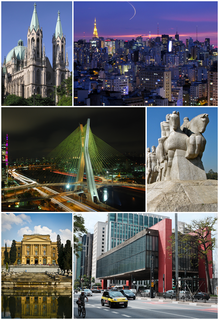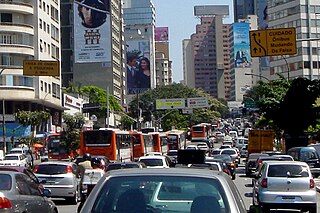
São Paulo is one of the 26 states of the Federative Republic of Brazil and is named after Saint Paul of Tarsus. As the richest Brazilian state and a major industrial complex, often dubbed the "locomotive of Brazil", the state is responsible for 33.9% of the Brazilian GDP. São Paulo also has the second highest Human Development Index (HDI) and GDP per capita, the fourth lowest infant mortality rate, the third highest life expectancy, and the third lowest rate of illiteracy among the federative units of Brazil, being by far, the safest state in the country. The homicide rate is 3.8 per 100 thousand as of 2018, almost 1/4 of the Brazilian rate. São Paulo alone is richer than Argentina, Uruguay, Paraguay and Bolivia combined. If São Paulo were an independent country, its nominal GDP would be ranked among the top 20 in the world. The economy of São Paulo State is the most developed in Brazil.

São Paulo is a municipality in the Southeast Region of Brazil. The metropolis is an alpha global city and the most populous city in Brazil, the Western Hemisphere and the Southern Hemisphere, besides being the largest Portuguese-speaking city in the world. The municipality is also the Earth's 11th largest city proper by population. The city is the capital of the surrounding state of São Paulo, the most populous and wealthiest state in Brazil. It exerts strong international influences in commerce, finance, arts and entertainment. The name of the city honors the Apostle, Saint Paul of Tarsus. The city's metropolitan area, the Greater São Paulo, ranks as the most populous in Brazil and the 12th most populous on Earth. The process of conurbation between the metropolitan areas located around the Greater São Paulo created the São Paulo Macrometropolis, a megalopolis with more than 30 million inhabitants, one of the most populous urban agglomerations in the world.

Bradesco is one of the biggest banking and financial services companies in Brazil. Bradesco was the largest private bank in Brazil until Banco Itaú and Unibanco merged in 2009. Bradesco is headquartered in the city of Osasco, in the metropolitan area of São Paulo, at Companhia Cidade de Deus, and has 5,314 branches, 4,834 Service Branches and 38,430 “Bradesco Expresso” Units, the correspondent bank through partnerships with supermarkets, drugstores, department stores and other retail chains. It is currently the third largest Brazilian bank by total assets. The bank is the world’s thirtysecond largest in market capitalization in 2014.

The University of São Paulo is a public university in the Brazilian state of São Paulo. It is the largest Brazilian public university and the country's most prestigious educational institution, the best university in Ibero-America, and holds a high reputation among world universities, being ranked 100 worldwide in reputation by the Times Higher Education World University Rankings. USP is involved in teaching, research and university extension in all areas of knowledge, offering a broad range of courses.

São Paulo/Congonhas AirportPortuguese pronunciation: [kõˈɡõɲɐs] is one of the four commercial airports serving São Paulo, Brazil. The airport is named after the neighborhood where it is located, formerly called Vila Congonhas, property of the descendants of Lucas Antônio Monteiro de Barros (1767–1851), Viscount of Congonhas do Campo, first president of the Province of São Paulo after the independence of Brazil in 1822, during the Empire. In turn, the Viscount's domain was named after the plural of a shrub known in Brazil as congonha-do-campo.

Science and technology in Brazil has entered the international arena in recent decades. The central agency for science and technology in Brazil is the Ministry of Science and Technology, which includes the CNPq and Finep. This ministry also has direct supervision over the National Institute for Space Research, the National Institute of Amazonian Research, and the National Institute of Technology (Brazil). The ministry is also responsible for the Secretariat for Computer and Automation Policy, which is the successor of the SEI. The Ministry of Science and Technology, which the Sarney government created in March 1985, was headed initially by a person associated with the nationalist ideologies of the past. Although the new minister was able to raise the budget for the science and technology sector, he remained isolated within the government and had no influence on policy making for the economy.
São Paulo Research Foundation is a public foundation located in São Paulo, Brazil, with the aim of providing grants, funds and programs to support research, education and innovation of private and public institutions and companies in the state of São Paulo. It was founded in 1962 and is maintained by endowments by the State government which are guaranteed as a fixed percentage of the State's tax income, besides the income generated by the financial fruition of its considerable assets.
World Movement for Democracy is an international network of individuals and organizations who share the common goal of promoting democracy. The World Movement was launched in February 1999 when the National Endowment for Democracy (NED) and two nongovernmental organizations in India brought together a cross-section of democracy activists, practitioners, and scholars from over 80 countries in New Delhi for discussions of ways to advance democracy. The participants adopted a Founding Statement launching the World Movement "to strengthen democracy where it is weak, to reform and invigorate democracy even where it is longstanding, and to bolster pro-democracy groups in countries that have not yet entered into a process of democratic transition." It is intended to unite the global community of democracy advocates and practitioners; to facilitate exchanges of information, knowledge, and experiences; and to build cross-border solidarity. The World Movement is led by an international steering committee, and NED currently serves as its secretariat.
Miss Brasil Pageant is a beauty contest that has been held since 1954 between winners of the pageants in the states of Brazil. The winner of Miss Brazil competes in the Miss Universe. The Miss Brazil, and Brazil itself, are responsible for one of the most successful campaigns in history of Miss Universe, with two winners and several runners-up, finalists and semifinalists. It was considered one of the best organized and most successful beauty pageants during the 1950s and 1960s and is believed that much of the fame of the beauty of Brazilian women comes from this. The current Miss Brazil, is from the state of Minas Gerais, Júlia Horta.

São Paulo State University is one of the six public universities of the Brazilian state of São Paulo. UNESP is part of the state’s higher education system and the only Brazilian member of the Compostela Group of Universities. Its is one of the few South American universities to be constantly listed as one of the best worldwide universities.

Unisinos is a Brazilian private Jesuit university founded in 1969. Its main campus is located in Southern Brazil, in the city of São Leopoldo, state of Rio Grande do Sul. Unisinos has more than 30,000 students in its 91 undergraduate programs, 19 academic master's programs, 6 professional master's programs, and 14 PhD programs, with six schools – Polytechnic, Business, Law, Health, Creative Industry, and Humanities.
Ibmec, is a Brazilian private university specializing in teaching and research in the fields of Business and Economics in Latin America. It was founded in 1970 in Rio de Janeiro and, since then, has expanded to two other campuses located in the cities of Belo Horizonte and Brasília.
Celso Lafer is a Brazilian jurist, full professor of Philosophy of Law at University of São Paulo, twice former foreign minister and a former commerce minister.

Transport in São Paulo plays a key role in the date-to-day life of the people of São Paulo. Although lacking in strong infrastructure, various methods of public transport are offered in the city, including a complex bus system run by SPTrans, and various subway and railway lines. A contactless smartcard is used for fare collection for the buses, subway, and railway systems. São Paulo also has three airports.
New Zealand Trade and Enterprise (NZTE) is New Zealand’s economic development and trade promotion agency. It offers strategic advice, access to networks and influencers, research and market intelligence, and targeted financial support to help businesses on their international journey, and works to promote and support the growth of New Zealand business overseas.

The Escola Politécnica of the University of São Paulo is an engineering school in the University of São Paulo (USP) in São Paulo, Brazil.

São Paulo is the 10th richest city in the world, and is expected to be the 6th richest in 2025. According to data of Fecomercio/SP, its gross domestic product (GDP) in 2011 was R$450 billion.

The TAV is planned to be Brazil's first planned high-speed rail service. The first line was proposed to run between Rio de Janeiro and São Paulo. It was expected to cover the 403 kilometres (250 mi) between Barão de Mauá station, and Campo de Marte Airport in an 85 minutes, reaching a maximum speed of 350 kilometres per hour (220 mph).
Fundação Getúlio Vargas is a Brazilian higher education institution and think tank founded on December 20, 1944, with a mission "To stimulate Brazil’s socioeconomic development". Its initial objective was to prepare qualified people to work in public and private administration in Brazil.

Centro Universitário da FEI is a higher education facility in São Bernardo do Campo, Brazil, offering undergraduate degrees in engineering, business administration, and computer sciences as well as master's degrees in mechanical engineering, electrical engineering, and administration; specialization courses are also offered. It is often ranked among the best Brazilian private engineering colleges and best overall in mechanical engineering, electrical engineering, and computer science.













